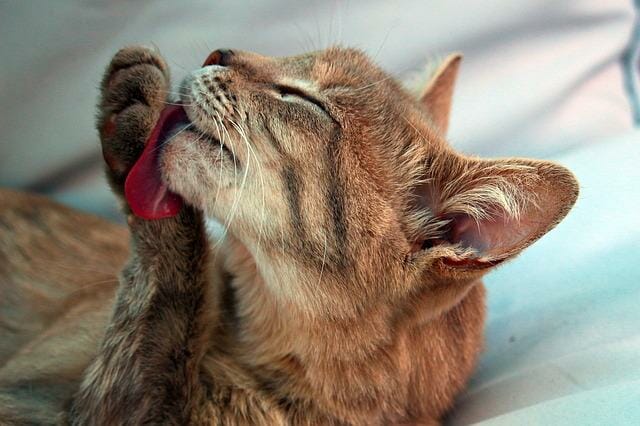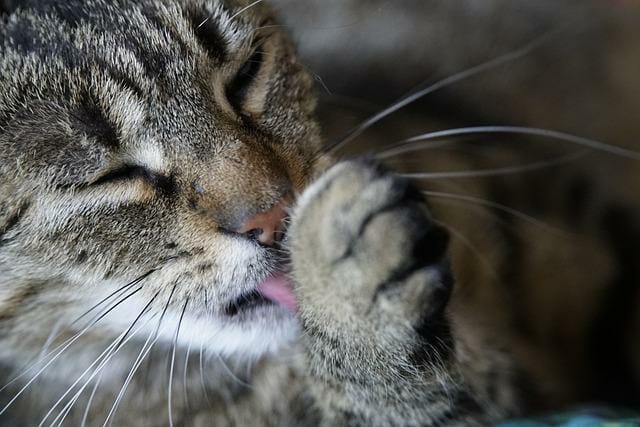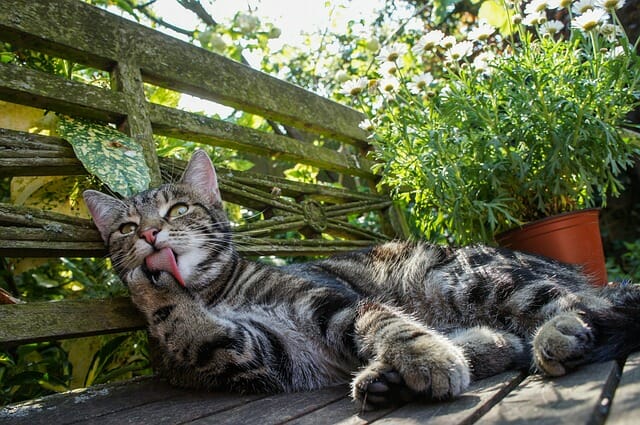When a Cat Licks You What Does It Mean: Reasons Why Your Cat Licks You and How to Deal With It
When a cat licks you, it can have different meanings depending on the situation. Here are some possible interpretations of a cat’s licking behavior toward humans:
- Affection: Cats may lick their owners as a sign of affection or as a way of grooming their human companions, similar to how they groom other cats.
- Bonding: Licking can also be a bonding behavior where the cat tries to establish a stronger connection with their owner.
- Request for attention: Cats may also lick their owners to get their attention, especially if they want to play or be fed.
- Stress or anxiety: In some cases, cats may excessively lick themselves or their owners due to stress or anxiety. If you notice your cat licking you excessively or compulsively, it may be a sign of an underlying issue that needs to be addressed.


Table of Contents
Understanding Your Cat’s Licking Habits
Affection
One of the main reasons why a cat may lick you is to show affection, according to PetMD. Cats can show affection in many ways, and licking is one of them. When a cat licks you, it may be a sign that they love and trust you. They may also try to bond with you and show that you are part of their social group.
Grooming
Grooming is one of the reasons why cats may lick their owners. Cats are fastidious groomers who may consider their owners part of their family and want to groom them. They may also lick their owners to show affection and bond with them. Additionally, cats may lick their owners to clean them or remove any dirt or debris from their fur. Licking can also signify submission or respect in the feline world, and some cats may lick their owners to show respect.
Marking Their Territory
Cats have scent glands on their body; when licking you, they transfer their scent onto you. This is a way for cats to mark their territory and claim you as part of their social group. It also means that your cat feels comfortable and safe around you. Additionally, cats may lick their owners to show affection and bond with them.
Attention Seeking
Attention-seeking is another possible reason why a cat may lick their owner. Cats are social creatures that crave attention and interaction from their human companions. When a cat licks their owner, it may be a way for them to solicit attention and affection in return. Additionally, cats may learn that licking their owners is a way to receive attention and positive reinforcement, leading to the behavior becoming a habit over time.
Stress relief
Another reason why cats may lick their owners is as a form of stress relief. Licking releases endorphins, which can have a calming effect on both cats and humans. So if your cat is feeling anxious or stressed, they may turn to licking to soothe themselves. This is especially common in situations such as going to the vet or during a thunderstorm.
However, it’s important to note that excessive licking can also indicate underlying medical or behavioral issues. So, it’s always best to monitor your cat’s behavior and consult your veterinarian if you have concerns.
Communication
Communication is another reason why cats may lick their owners. Cats use body language to communicate with their owners and other cats. Licking is one way for a cat to express affection or request attention. It can also be a way for a cat to communicate that they are hungry, thirsty, or want to play.


Additionally, cats may lick their owners to signal that they are feeling anxious or stressed as a way to self-soothe. Cat owners must observe their body language and behavior to understand their needs better and want.
Tips to Stop a Cat From Licking You
Distract Your Cat
Distracting your cat is one way to stop them from licking you. You can offer them a toy or a treat to divert their attention away from licking you. Another way to distract your cat is to engage them in play or provide some other form of entertainment, such as a puzzle toy or a scratching post.
Suppose your cat is licking you excessively, becoming a problem. In that case, you can also redirect their behavior by providing an alternative outlet for their grooming instincts. For example, you can give them a soft brush to groom themselves with or encourage them to groom a toy instead of you.
It’s also important to ensure that you provide your cat with enough mental and physical stimulation throughout the day, as boredom or anxiety can sometimes manifest as excessive licking or grooming behavior.
Ignore Them
If you want to discourage your cat from licking you, one approach is to ignore them when they start licking. This may involve getting up and walking away or gently moving them away from you. It’s important not to punish your cat for licking as this can be confusing and may damage your relationship with your cat.
Instead, redirect their attention to an appropriate activity, such as playing with a toy or grooming themselves. Consistency is key to reinforcing this behavior, so remain consistent in your approach. For example, if your cat’s licking becomes excessive or obsessive, it’s a good idea to consult your veterinarian to rule out any underlying medical conditions or behavioral issues.
Say “No” Firmly
Saying “No” firmly can help teach your cat to stop licking you. However, doing so is important without yelling or scaring your cat. A firm and assertive tone can be enough to convey your point. It’s also important to redirect your cat’s attention to a toy or another activity to distract them from licking you. Positive reinforcement, such as treating your cat when they stop licking you, can also help encourage good behavior.
Provide an Alternative
Providing an alternative can be a great way to redirect your cat’s attention away from licking you. For example, you can offer your cat a toy, treat or engage them in playtime to distract them from licking. This can help establish a positive association with the alternative activity and reinforce the desired behavior.
Consider giving your cat more attention or affection when they are not licking you, as this can help reinforce the behavior you want to see. Consistency is key when changing your cat’s behavior, so be patient and persistent.
Use Deterrents


As licking is a natural behavior for cats, it is not recommended to use deterrents to stop them from licking you. Instead, you can redirect their behavior to an appropriate object or activity. However, suppose your cat’s licking is excessive and causing harm to you. In that case, it may indicate an underlying health or behavioral issue, and you should consult a veterinarian or a certified animal behaviorist.
Seek Veterinary Advice
Suppose your cat’s licking behavior is excessive, compulsive, or causing harm. In that case, it may be a sign of an underlying medical or behavioral issue that needs to be addressed by a veterinarian. In such cases, seeking veterinary advice is recommended. The vet can perform a physical exam, review the cat’s medical history, and recommend further tests or treatments. They may also be able to provide behavioral advice or refer you to a veterinary behaviorist for more specialized care.
